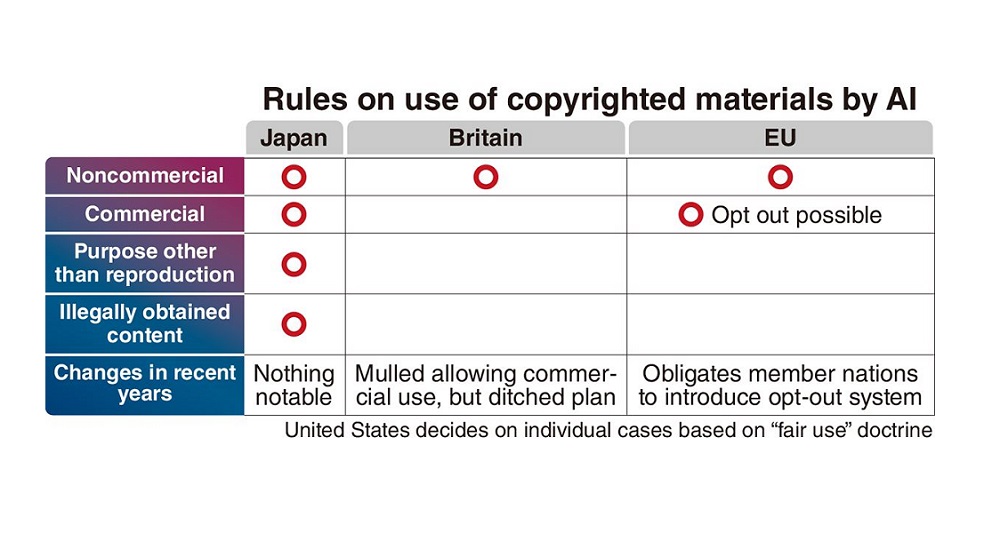
1:00 JST, April 29, 2023
A group of creative artists met with government officials in Tokyo this week to discuss legal protections from generative artificial intelligence tools such as ChatGPT, as Japanese regulations are considered to be the loosest among advanced nations.
Artistic works can be used to “train” AI models with almost no conditions in Japan, raising concerns among illustrators, manga artists, musicians and other creatives, regarding the possibility of copyright infringement.
The situation has prompted calls for new rules to be drawn up to address this situation.
In the meeting with Diet members and officials from the Cabinet Office and the Cultural Affairs Agency on Thursday, the group said that using copyrighted material to train AI without permission was “having a negative impact” on their activities.
The group also raised other issues they considered problematic, including the fact that Article 30-4 of the Copyright Law, which permits the use of a copyrighted work for machine learning, does not include procedures for gaining permission in advance from copyright holders.
The article, which was included in a 2018 revision, permits the use of copyrighted material such as text and images to train AI, regardless of whether the model is for commercial use. Under the current law, it is legal to train AI with copyrighted material even if the data was obtained illegally.
The article contains a provision that states such material cannot be used if it would “unreasonably prejudice the interests of the copyright owner.” However, the agency has provided only limited examples of such cases, including the “copying of commercial data sets.” In addition, there is no way for copyright holders to opt out of making their material available for training AI models.
In contrast to Japan, many European countries are working on legislation designed to protect copyright holders.
In Britain, legally obtained copyrighted works can be freely used for nonprofit research. Using these works for commercial purposes requires approval from the copyright holder.
In 2022, the British government considered legal revisions that would allow such materials to be used freely also for commercial purposes, but the plan was scrapped in February 2023 out of consideration for creators and others involved in the creation of artistic works.
In 2019, the European Union made it possible for copyrighted works to be used for academic research purposes. The bloc also issued a directive that ordered member nations to take steps including establishing a system to give rights holders the ability to opt out of having their works used for purposes other than academic research. France, Germany and other nations have introduced provisions based on this directive in a bid to protect copyright holders.
The United States’ “fair use” doctrine allows copyright-protected works to be used in some circumstances. Courts decide on a case-by-case basis whether the use of such works constitutes copyright infringement. Each decision takes into account four factors, including the “amount and substantiality” of the portion taken and the “effect of the use on the potential market for or value of the copyrighted work.” Canada has similar regulations that allow “fair dealing,” which is decided for individual cases.
In the United States, there have been no cases that clearly determined whether AI’s use of copyrighted works fell under “fair use.” But in January, artists filed a lawsuit against developers that allegedly used hundreds of millions of artworks to train their AI models. The outcome of this case will be closely watched.
Japan’s Copyright Law was revised and loosened in 2009 and 2012 amid calls from the tech sector and other industries for regulations that would allow the free use of copyrighted materials so that domestic firms could develop tools that would enable them to compete with IT giants overseas.
Copyright Law expert Prof. Makoto Nagatsuka of Hitotsubashi University said a French expert couldn’t understand why Japanese law “gave such preferential treatment to AI development.”
“Article 30-4 of the Copyright Law is peculiar among the laws of advanced nations because, among other things, it doesn’t differentiate between commercial and noncommercial use,” Nagatsuka said. “At this very moment, commercial AI is generating vast amounts of images and texts. Protections for copyright holders should be strengthened, such as by introducing an opt-out system for their works.”
Top Articles in Society
-

Producer Behind Pop Group XG Arrested for Cocaine Possession
-

Man Infected with Measles Reportedly Dined at Restaurant in Tokyo Station
-

Man Infected with Measles May Have Come in Contact with Many People in Tokyo, Went to Store, Restaurant Around When Symptoms Emerged
-

Woman with Measles Visited Hospital in Tokyo Multiple Times Before Being Diagnosed with Disease
-

Australian Woman Dies After Mishap on Ski Lift in Nagano Prefecture
JN ACCESS RANKING
-

Producer Behind Pop Group XG Arrested for Cocaine Possession
-

Japan PM Takaichi’s Cabinet Resigns en Masse
-

Man Infected with Measles Reportedly Dined at Restaurant in Tokyo Station
-

Israeli Ambassador to Japan Speaks about Japan’s Role in the Reconstruction of Gaza
-

Videos Plagiarized, Reposted with False Subtitles Claiming ‘Ryukyu Belongs to China’; Anti-China False Information Also Posted in Japan





















